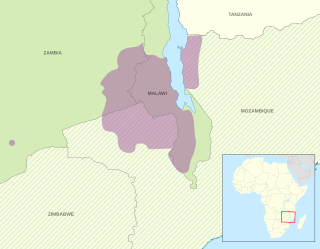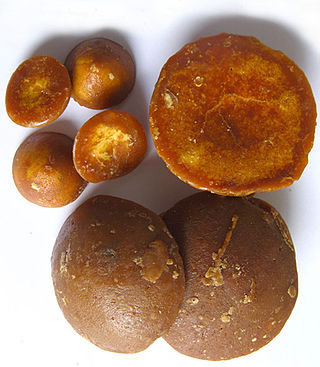Related Research Articles

Goulash is a soup or stew of meat and vegetables seasoned with paprika and other spices. Originating in Hungary, goulash is a common meal predominantly eaten in Central Europe but also in other parts of Europe. It is one of the national dishes of Hungary and a symbol of the country.

Afghan Girl is a 1984 photographic portrait of Sharbat Gula, an Afghan refugee in Pakistan during the Soviet–Afghan War. The photograph, taken by American photojournalist Steve McCurry near the Pakistani city of Peshawar, famously appeared on the June 1985 cover of National Geographic. While the portrait's subject initially remained unknown, she was identified by early 2002: Gula, an ethnic Pashtun from Afghanistan's Nangarhar Province, was a 12-year-old child residing in Pakistan's Nasir Bagh.

Chewa is a Bantu language spoken in much of Southern, Southeast and East Africa, namely the countries of Malawi, where it is an official language, and Mozambique and Zambia. The noun class prefix chi- is used for languages, so the language is usually called Chichewa and Chinyanja. In Malawi, the name was officially changed from Chinyanja to Chichewa in 1968 at the insistence of President Hastings Kamuzu Banda, and this is still the name most commonly used in Malawi today. In Zambia, the language is generally known as Nyanja or Cinyanja/Chinyanja '(language) of the lake'.

Mari Boine is a Norwegian Sámi singer. She combined traditional Sámi joik singing with rock. In 2008, she became a professor of musicology at Nesna University College.
The Bua languages are a subgroup of the Mbum–Day subgroup of the Savanna languages spoken by fewer than 30,000 people in southern Chad in an area stretching roughly between the Chari River and the Guéra Massif. They were labeled "G13" in Joseph Greenberg's Adamawa language-family proposal. They are ultimately part of the Niger–Congo family, and have exerted a significant influence on Laal.
The Gula Iro language is a Bua language spoken by some 3,500 people north and east of Lake Iro in southern Chad, between the Bola and Salamat rivers. It has four dialects, according to Pairault:

Palm sugar is a sweetener derived from any variety of palm tree. Palm sugar is sometimes qualified by the type of palm, as in coconut palm sugar. While sugars from different palms may have slightly different compositions, all are processed similarly and can be used interchangeably.

Guéra is one of the 23 regions of Chad, created in 2002 from the former Guéra prefecture. The region's capital is Mongo. As of 2009, the population of the region was 553,795.

Salamat is one of the 23 regions of Chad, located in the south-east of the country. The region's capital is Am Timan. It corresponds to the former prefecture of the same name.

Nick Gulas was an American professional wrestling promoter in the Southern United States, partnered with Tennessee promoter Roy Welch for decades. Gulas was also known as "The King of Managers", "King B", and the "Dean of Promoters".

Sago pudding is a sweet pudding made by combining sago pearls with either water or milk and adding sugar and sometimes additional flavourings. It is made in many cultures with varying styles, and may be produced in a variety of ways. Southeast Asia, especially Indonesia and Malaysia, produces the majority of sago.
Buyang is a Kra language spoken in Guangnan and Funing counties, Yunnan Province, China by the Buyang people. It is important to the reconstruction of the hypothetical macrofamily Austro-Tai as it retains the disyllabic roots characteristic of Austronesian languages. Examples are "to die", "eye", "head", and "eight".

Coconut sugar is a palm sugar produced from the sap of the flower bud stem of the coconut palm.
The Kara languages are Tar Gula and possibly related Central Sudanic languages of the Central African Republic. The name Kara is used for numerous other peoples of the region, and so is often ambiguous.

Gula Matari is a 1970 studio album by Quincy Jones.

Adrián Guľa is a former football player from Slovakia and manager who currently manages DAC Dunajská Streda. His other formerly managed teams include AS Trenčín and Viktoria Plzeň or Wisła Kraków.
The Gula'ala language is spoken just off Malaita Island in the Solomon Islands.

NWA Mid-America was a professional wrestling promotion territory under the umbrella of the National Wrestling Alliance (NWA) that promoted shows in Tennessee, Kentucky and Alabama from the 1940s until 1981. The company was founded in the 1940s by Nick Gulas and Roy Welch and was one of the first promotions to join the NWA after it was founded in 1948. From 1953 until late 1974, John Cazana promoted the Knoxville area and Joe Gunther promoted the Birmingham area from around 1940 until some point in the 1970s. In 1977, promoter Jerry Jarrett and wrestler Jerry Lawler broke away from NWA Mid-America, breaking the Memphis area off to start on the own under the name the Continental Wrestling Association (CWA). Mid-America stopped promoting in 1981 and the CWA took over most of their territory as well as some of the championships promoted by NWA Mid-America
Sharbat Gula is an Afghan woman who became internationally recognized as the 12-year-old subject in Afghan Girl, a 1984 portrait taken by American photojournalist Steve McCurry that was later published as the cover photograph for the June 1985 issue of National Geographic. The portrait was shot at Nasir Bagh, Pakistan, while Gula was residing there as an Afghan refugee fleeing the Soviet–Afghan War. Despite the photograph's high global recognition, Gula's identity remained unknown until 2002, when her whereabouts were verified and she was photographed for the second time in her life. Having lived and raised a family in Pakistan for 35 years, Gula was arrested by Pakistani authorities in 2016 and subsequently deported to Afghanistan in 2017 on the charge of possessing forged identity documents. However, in November 2021, Gula was granted asylum in Italy, three months after the Taliban takeover of Afghanistan.

Gula was a Mesopotamian goddess of medicine, portrayed as a divine physician and midwife. Over the course of the second and first millennia BCE, she became one of the main deities of the Mesopotamian pantheon, and eventually started to be viewed as the second highest ranked goddess after Ishtar. She was associated with dogs, and could be depicted alongside these animals, for example on kudurru, and receive figurines representing them as votive offerings.
References
- ↑ Bon Gula at Ethnologue (18th ed., 2015) (subscription required)